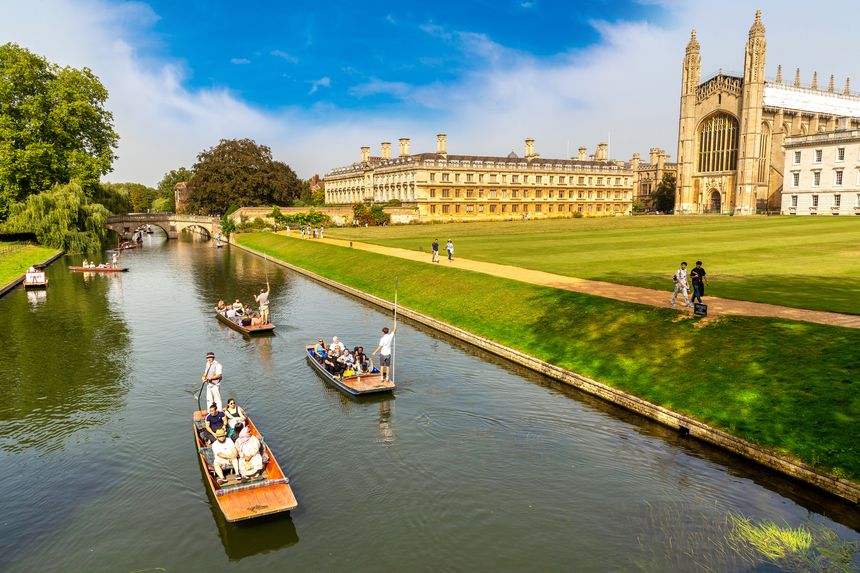Cambridge is renowned for its centuries-old academic excellence, but in the modern day, it has become a powerhouse of innovation. WIPO’s 2025 Global Innovation Index named the city as the most intensive science and technological cluster in Europe (and second in the world) relative to population density. From biotech breakthroughs to AI startups, the city is producing globally recognised brands, which brings with it a growing need for strategic trade mark protection.
Whilst the UK Intellectual Property Office does not publish trade mark filing data on a city-by-city basis, the published statistics show that the “East of England” region is ranked 4th in the UK for trade mark filing volumes; Cambridge is the largest University city in the region. Filing data obtained from the UKIPO’s Statistics team show that applications with “Cambridge” or “Cambridgeshire” in the Applicant’s address accounted for roughly 10% of the East of England region’s new applications in 2024.
Compared to other “innovation clusters”, Cambridge stands out for its density of high-growth companies emerging directly from academic research, and the University of Cambridge plays a pivotal role in this trend. Through Cambridge Enterprise, the University’s commercialisation arm, researchers are supported in protecting and monetising their intellectual property, including trade marks.
Trade marks are essential in the journey from research to revenue, helping startups establish credibility, attract investment, and differentiate themselves in crowded markets. In Cambridge, this process is accelerated by a culture of collaboration between academia and industry.
Companies like ARM, Darktrace, and Abcam are solid examples of this. Each began with strong technical foundations, and has evolved over time into world-renowned brands. Their success underscores the importance of early and strategic trade mark registration, not just for legal protection, but for building trust and recognition both in the marketplace and with potential investors.
Start-ups often face challenges in navigating trade mark law. There is a common misconception that registering a business name provides trade mark protection, when this is not the case; just because your chosen name is available on the Companies Register, this does not mean it is legally available as a trade mark. Clearance searches are key at the outset, if you are to avoid the risk of infringement proceedings or a costly rebrand at a later date.
In Cambridge specifically, where many companies take branding inspiration from their city of origin, there can be an additional challenge in registering trade marks without encroaching upon the registered rights of the University (which are comprehensive).
Whilst it is possible to file an application to register a trade mark yourself, statistics show that the chances of successfully securing registration are much higher if an application is filed with the support of a legal representative. Around 70% of all applications filed by UK-based applicants are self-filed, however, those filed by a legal representative on their behalf are more than twice as likely to reach registration.
This is because a qualified Trade Mark Attorney will be able to guide you through the process of selecting a trade mark that is registrable, conduct clearance searches to ensure that it does not conflict with pre-existing rights, and draft a suitable list of goods/services to be covered by your application, in accordance with the Trade Mark Registry’s requirements. These steps will serve to minimise the risk of objections or oppositions arising, but if something does come up, they will also be able to guide you through the best way to overcome those obstacles.
Trade marks are more than marketing symbols. They’re strategic assets that help innovators turn ideas into growth, investment, and commercial success. In a city where the boundaries between academia and industry are increasingly blurred, brand protection is a vital part of the innovation journey. For researchers, founders, and investors alike, the message is clear: start thinking about trade marks early. In Cambridge, the next big idea is always just around the corner, and it deserves a name that will last.


/Passle/6130aaa9400fb30e400b709a/SearchServiceImages/2026-03-02-09-25-03-360-69a5576f843c161e183b0e4f.jpg)
/Passle/6130aaa9400fb30e400b709a/SearchServiceImages/2026-02-26-15-54-56-695-69a06cd03a6e69b01f61e487.jpg)
/Passle/6130aaa9400fb30e400b709a/SearchServiceImages/2026-02-25-16-00-40-354-699f1ca8de0dd5cefa7018ad.jpg)